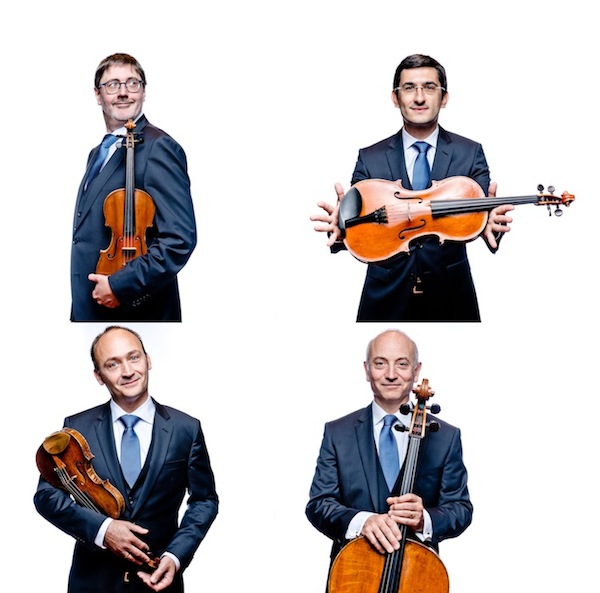Quatuor Danel ignites a fire with Weinberg and Shostakovich

Quatuor Danel performed Sunday afternoon at the Phillips Collection. Photo: Marco Borggreve
The Quatuor Danel’s complete traversals of the string quartets of Mieczysław Weinberg and Dmitri Shostakovich have been highlights on disc in recent years. The French string quartet, formed in 1991, brought examples of both to its concert at the Phillips Collection on Sunday afternoon.
Weinberg, a prodigious Soviet composer of the generation after Shostakovich, is finally having the rediscovery he deserves, even in Washington, where the National Symphony Orchestra played one of his pieces in January. His seventeen string quartets, two more than Shostakovich, are a revelation. The Quatuor Danel gave what they later learned was the world premiere of Weinberg’s String Quartet No. 3 in 2007, and they performed it with their signature brashness here on Sunday.
The first movement pulsated with an obsessive moodiness, excepting some quieter moments in the middle. In the second movement, the unison playing of the second violinist, violist, and cellist was intense, with first violinist Marc Danel keening in alternation with it. Second violinist Gilles Millet had a sweet, more rarified sound when he took over that lament theme, matched by violist Vlad Bogdanas. The lovely fugue of the third movement, much of it played with mutes on, was based on a carefree subject betraying little of the cynical undercutting one might hear from Shostakovich.
At the conclusion of the concert, more Weinberg served as an encore, the blistering Scherzo movement of the composer’s String Quartet No. 5. Here was the acerbic style we might associate more with Shostakovich. It made doubly welcome the news that the Phillips Collection will host the Quatuor Danel again in the 2018-2019 season, to play the complete cycle of Weinberg’s string quartets.
Shostakovich composed his String Quartet No. 3 in 1946, two years after Weinberg’s. It is a more bitter work, possibly embodying the composer’s thoughts on the calamity of the war that had just ended. The performers played the first movement at a tempo faster than optimal, but they also took plenty of rubato, caressing the main theme. A similar harshness of attack prevailed in this work as it had in the Weinberg, paying dividends in the forceful parts of the second movement. The visceral terror of the third movement was relentless, obsessive, and inescapable.
Hearing the two works side by side showed a striking similarity between Shostakovich’s fourth movement and the lament in the Weinberg quartet. Bogdanas had a burnished, subdued tone on the extended viola solo that ends this movement. An easy complacency returned in the fifth movement, a laid-back tone that recalled the quartet’s interpretation of that inane opening theme. All of these qualities together, especially the vitality and ensemble unity of the playing, were a reminder of why the group’s Shostakovich recorded set is such a contender.
The group’s strength was in the vicious nature of their forte sound, which did not serve the opening work, Mendelssohn’s String Quartet in F minor, Op. 80, nearly as well. It is also an expression of grief, composed in the wake of the death of Mendelssohn’s beloved sister Fanny and completed shortly before the composer’s own death. Even so, the desperate, anger-fueled approach that worked so well for the other pieces here felt unidiomatic and overblown.
The fault certainly did not lie in the group’s technique, with a frenetic pacing of the first movement creating a thrilling, restless quality. They pushed the envelope with merciless hammering of accents, and the tempo choice in the second movement made many of the turn-ornaments fuzzy. Similar problems cropped up in the third movement and in the finale, where the roiling notes flew by furiously. Still the musicians’ unforgiving Mendelssohn was the only misjudged work on an otherwise successful and illuminating program.
The concert season at the Phillips Collection ends early this year due to a renovation project. Next week’s performance will be the last, featuring violist Maxim Rysanov and pianist Alexander Kobrin 4 p.m. Sunday. phillipscollection.org
